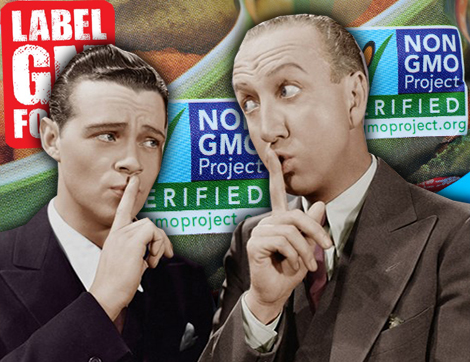
• Biotech lobbyists want you in dark about dangers of genetically modified foods.
By James Spounias —
A sneaky trick to attach the Denying Americans the Right to Know (DARK) Act to the December 2015 appropriations bill has fortunately failed. The DARK Act is what food activists have been calling the so-called Safe and Accurate Food Labeling Act of 2015, which would deny Americans the right to know whether there are genetically modified ingredients in their food.
However, the reality is that this legislation may yet be snuck in, as a rider to another bill, while the public is either asleep or traumatized by actual or manufactured terror.
Emigrate While You Still Can! Learn More . . .
The time to take urgent action is now.
We must call or write our senators and let them know we are opposed to the DARK Act, passed in the House as the Safe and Accurate Food Labeling Act of 2015 (H.R. 1599) in July 2015 without any meaningful scrutiny or debate.
As of this writing, no companion bill has been introduced in the Senate. However, biotech lobbyists have tried to sneak it in as a rider to other bills, such as the appropriations bill. We need to tell our senators that we are aware of these tricks and we oppose them. We do not want the DARK Act passed by the Senate under any circumstances.
More than 90% of Americans support GMO labeling, according to the activist group Just Label It. The organization reports, “Voter support for labeling GMO foods is nearly unanimous” according to a 2012 Mellman Group poll, and cites results of four previous polls as well: “93% believe GMO foods should be labeled (October 2010, Thomson Reuters PULSE™ Healthcare Survey, ‘National Survey of Healthcare Consumers: Genetically Engineered Food’); 95% of consumers believe GMO foods should be labeled (November 2008, Consumers Union, ‘Food-Labeling Poll: 2008,’ p. 13); 94% believe genetically modified food should be labeled (September 17, 2010, The Washington Post); 93% of the American public wants the federal government to require mandatory labeling of genetically modified foods (June 19, 2011, ABC News).”
Are GMOs safe?
According to attorney Steven Druker of the Alliance for Bio-Integrity and author of the book Altered Genes, Twisted Truth, the answer is no.
Druker writes: “Some of the greatest confusion involves food safety. For instance, the bill’s sponsor, Congressman [Mike] Pompeo [R.-Kan.], declared that consumer demands for labeling of GE foods have nothing to do with health or safety, and its other supporters have backed that assertion and proclaimed that no legitimate food safety concerns exist. Even the main witness who testified against the bill before a congressional committee in 2014 declared that there aren’t any. But this is flat-out false. For example, science-based concerns about the dangers to human health were repeatedly raised in memos written by the technical experts at the U.S. Food and Drug Administration (FDA) when they analyzed the risks of genetic engineering in 1991. The pervasiveness of the concerns within the scientific staff is attested by a memo from an FDA official who asserted: ‘The processes of genetic engineering and traditional breeding are different, and according to the technical experts in the agency, they lead to different risks.’ ”
America’s FDA isn’t alone, Druker notes. “Such concerns have been expressed in subsequent years by numerous other scientists and scientific institutions as well, including the British Medical Association, the Public Health Association of Australia, and the respected medical journal The Lancet. One of the strongest sets of cautions appeared within an extensive report issued by the Royal Society of Canada, which declared (a) that it is ‘scientifically unjustifiable’ to presume that GE foods are safe and (b) that the ‘default presumption’ for every one of them should be that the genetic alteration has induced unintended and potentially harmful side effects.”
Even the industry’s own safety assessments, if analyzed properly, reveal that GMOs are less than safe.
Druker notes: “Laboratory testing has confirmed the legitimacy of the concerns, and a number of well-conducted research studies on GE foods published in peer-reviewed scientific journals have detected statistically significant instances of harm to the laboratory animals that were consigned to consume them. Moreover, a review of the scientific literature on GE foods (itself published in a peer-reviewed journal in 2009) concluded that ‘most’ of the safety assessments have not only indicated problems, but indicated that ‘many GM [genetically modified] foods have some common toxic effects.’ ”
This is not to suggest that the FDA or other agencies have properly acted on the 1991 declaration that Druker cites. He writes, “it’s widely believed [erroneously] that the FDA is assiduously following the law and subjecting GE foods to rigorous scientific review. But in reality, that agency has not conducted a genuinely scientific review for any GE food on the market, and far from following the law, it’s been deliberately violating the law’s express mandates in order to enable these products to be marketed without the kinds of testing that the law requires.”
Vermont has enacted its own GMO labeling law, which will take effect in July 2016. The DARK Act would override state labeling requirements, however, and this is why more attempts to sneak the DARK Act through the Senate will likely be made.
Americans would demand the removal of all GMOs and other contaminants, such as glyphosates, and the compensating of victims. Until then, having GMOs labeled is all we can do.
James Spounias is the president of Carotec Inc., originally founded by renowned radio show host and alternative health expert Tom Valentine and his wife, Carole. To receive a free issue of Carotec Health Report—a monthly newsletter loaded with well-researched and reliable alternative health information—please write Carotec, P.O. Box 9919, Naples, FL 34101 or call 1-800-522-4279. Also included will be a list of the high-quality health supplements Carotec recommends.

